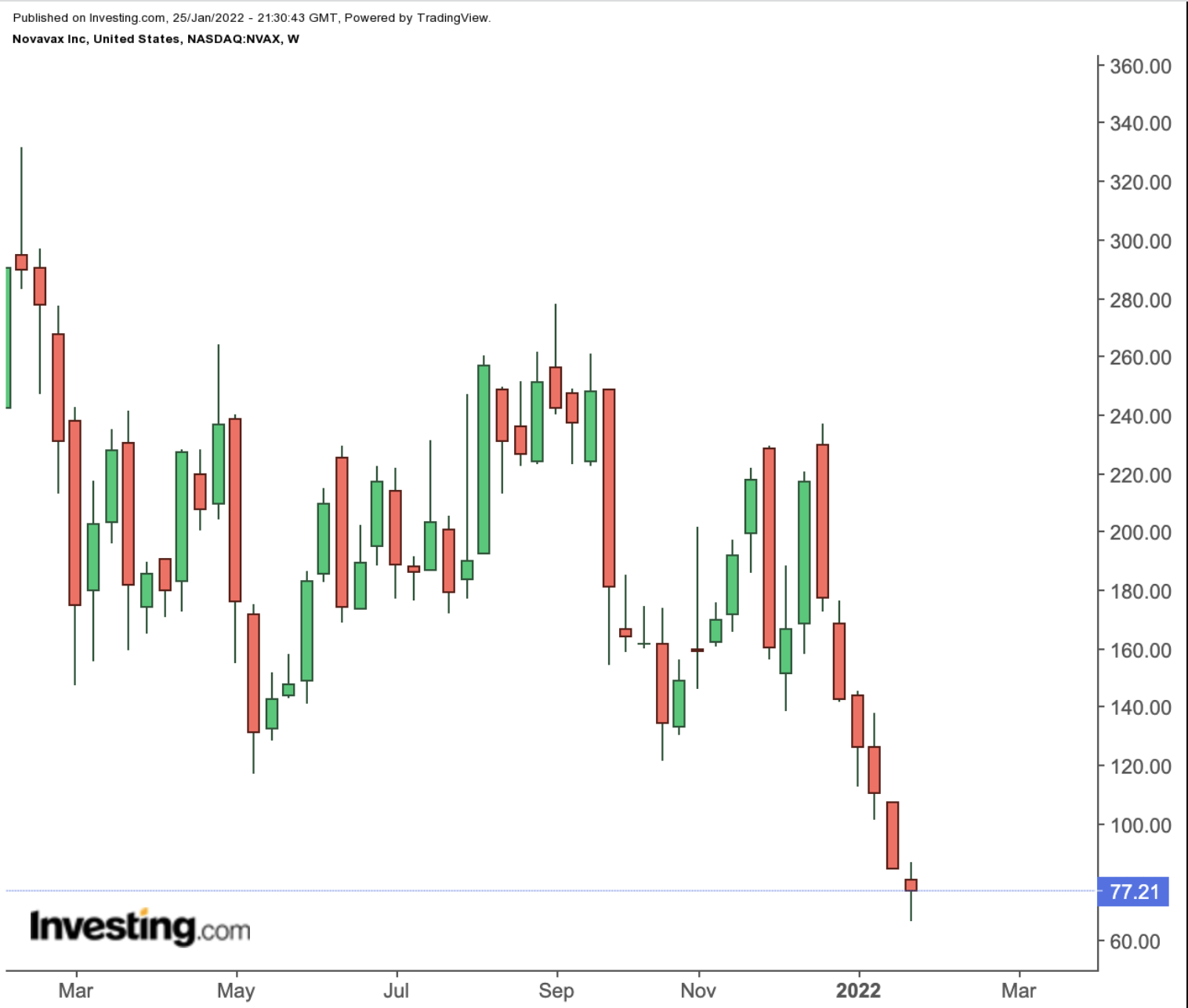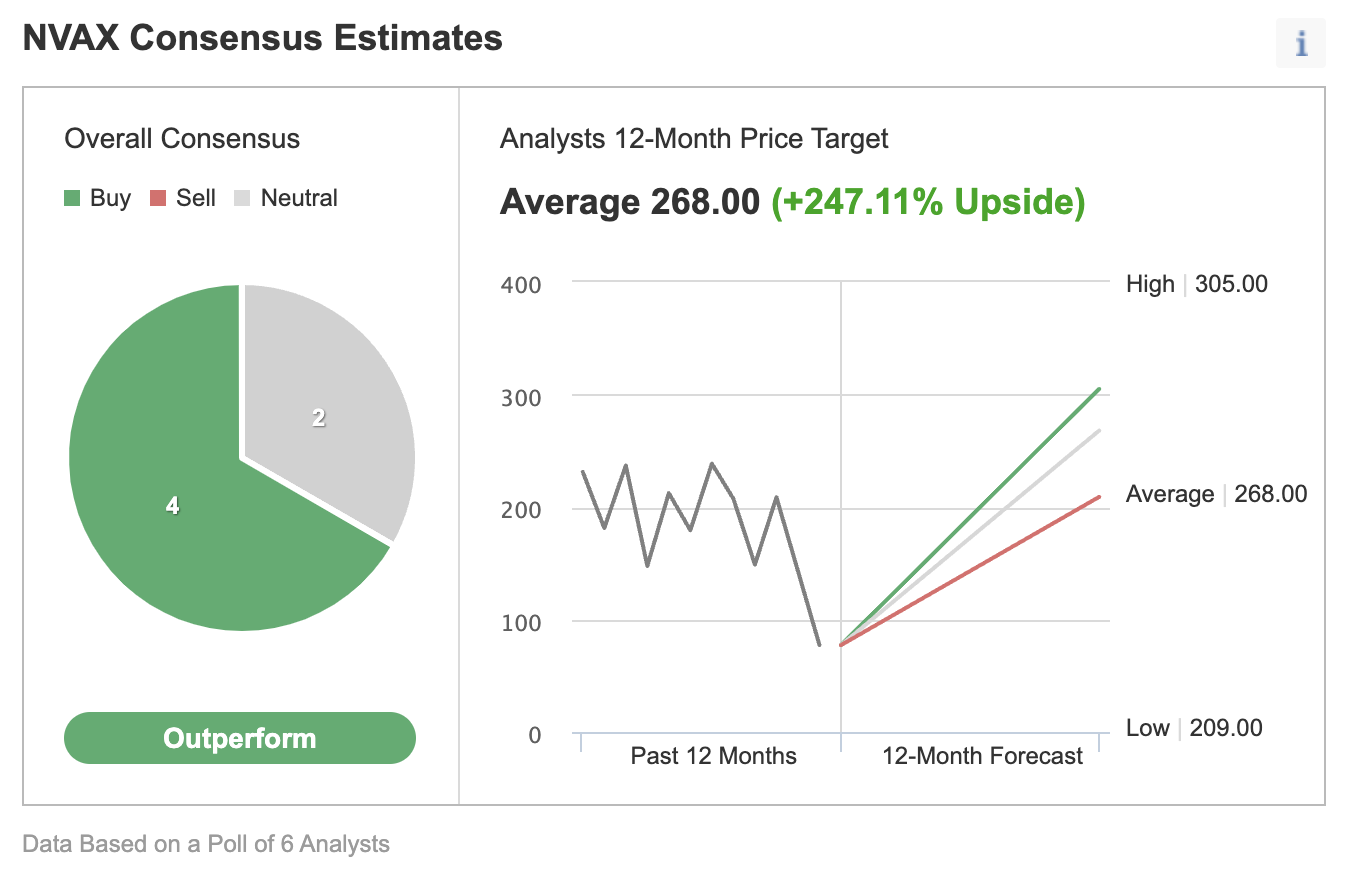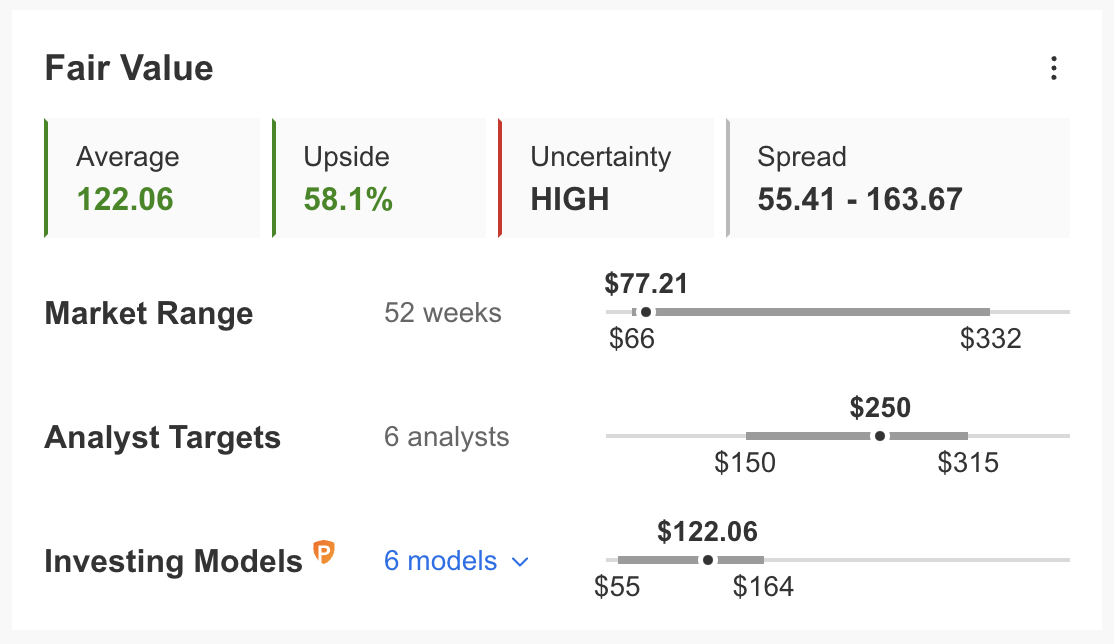- Pre-commercial biotech group Novavax’s stock is down more than 45% in January.
- The FDA has not yet authorized Novavax’s vaccine for use in the US.
- Long-term investors could consider buying the dips in NVAX shares, especially if they decline toward $70.
Shareholders in biotech name Novavax (NASDAQ:NVAX) have seen the value of their investment drop more than 38% over the past 52 weeks and 45% year-to-date. By comparison, the Dow Jones Biotechnology Index is down about 8% in the past 12 months and 13% YTD.

On Feb. 9, 2021, NVAX shares surpassed $330, hitting a record high. However, on Jan. 24, 2022 shares saw a 52-week low of $66.38.
As of Tuesday's close they're at $77.21. The stock’s 52-week range has been $66.38-$331.68, with the market capitalization currently at $5.9 billion.
The Maryland-based, pre-commercial biotech company focuses on vaccines against infectious diseases. Novavax management has been putting resources into research and development, and, as a result, has been reporting losses for many years.
Understandably, the group found itself in the spotlight during the pandemic. In early March 2020, NVAX shares were changing hands around $10. All of this means that despite the recent decline in the stock price, the proverbial $1,000 invested in the company less than two years ago would now be worth $7,700.
The World Health Organization (WHO) accepted “Nuvaxovid (NVX-CoV2373) vaccine against COVID-19 and Covovax (NVX-CoV2373) vaccine against COVID-19 for emergency use on Dec. 20, 2021, and Dec. 17, 2021, respectively.”
However, the US Food and Drug Administration does not yet have an approval in place for vaccines developed by Novavax. The company has recently finalized the data needed for the FDA submission. And the European Medicines Agency (EMA) has granted only “a conditional marketing authorization for Novavax’s COVID-19 vaccine Nuvaxovid (also known as NVX-CoV2373).” It is a protein-based vaccine.
Meanwhile, three vaccines developed by four companies (in alphabetical order) currently have FDA approval:
Also, in many European countries, including the U.K., the vaccine developed by AstraZeneca (NASDAQ:AZN) has been approved and administered over the past year.
So even if Novavax vaccines were to get FDA approval soon, the biotech name is not likely to benefit from COVID-19 vaccine sales as much as the other biopharma names.
How Recent Metrics Came In
Novavax released Q3 figures on Nov. 4. The company reported $178.8 million in revenue, thanks to development agreements. Net loss of $322.4 million translated into $4.31 per share. A year ago, net losses had been $197.3 million, or $3.21 per share.
CEO Stanley C. Erck said:
“We believe the highly encouraging results from our six-month booster study complement the strong efficacy demonstrated by NVX-CoV2373 to date, and we remain confident that our vaccine will serve as an important tool to fight COVID-19 in the years to come."
Other than the COVID-19 vaccine, the company has another vaccine, NanoFlu, which is in Phase 3. NanoFlu is being developed against influenza for adults 65 years and older.
Wall Street does not expect to see profits from Novavax anytime soon. Therefore, shares remain speculative.
Prior to the release of the quarterly results, NVAX stock was around $180. Now, it is trading lower, down more than 55% in less than three months.
Next Move In NVAX Stock?
Among six analysts polled via Investing.com, Novavax shares have an “outperform” rating, with an average 12-month price target of $268. Such a move would imply an increase of well over 240% from the current level. The target range is between $209 and $305.

Source: Investing.com
Similarly, according to a number of valuation models like those that might consider P/E or P/S multiples or terminal values, the average fair value for NVAX stock via InvestingPro stands at $122.06.

Source: InvestingPro
Readers who watch technical charts might be interested to know that a number of Novavax's short- and intermediate-term oscillators are oversold. Although they can stay extended for weeks—if not months—the decline in price could also be coming to an end.
Our expectation is for NVAX to find strong support at the $70 level. Although it might initially dip below it, shares are likely to bounce back before too long. Afterward, Novavax stock would likely trade sideways while it establishes a new base.
Cash-Secured Puts on Novavax
Investors who are not concerned with daily moves in price and who believe in the long-term potential of the company could consider investing in NVAX stock now. They could expect the shares to make a move toward $122.06, or the fair value estimate given by various models.
Those who are experienced with options could also consider selling a cash-secured put option in NVAX stock—a strategy we regularly cover. As it involves options, this setup will not be appropriate for all investors.
Such a bullish trade could especially appeal to those who want to receive premiums (from put selling) or to possibly own Novavax shares for less than their current market price of $77.21.
A put option contract on NVAX stock is the option to sell 100 shares. Cash-secured means the investor has enough money in his or her brokerage account to purchase the security if the stock price falls and the option is assigned. This cash reserve must remain in the account until the option position is closed, expires or is assigned, which means ownership has been transferred.
Let's assume an investor wants to buy Novavax stock, but does not want to pay the full price of $77.21 per share. Instead, the investor would prefer to buy the shares at a discount within the next several months.
One possibility would be to wait for NVAX stock to fall further, which it might or might not do. The other possibility is to sell one contract of a cash-secured Novavax put option.
So the trader would typically write an at-the-money (ATM) or an out-of-the-money (OTM) put option and simultaneously set aside enough cash to buy 100 shares of the stock.
Let's assume the trader is putting in this trade until the option expiry date of April 14, 2022. As the stock is $77.21 at time of writing, an OTM put option would have a strike of $70.
So the seller would have to buy 100 shares of Novavax at the strike of $70 if the option buyer were to exercise the option to assign it to the seller.
The NVAX Apr. 14, 2022, 70-strike put option is currently offered at a price (or premium) of $14.90.
An option buyer would have to pay $14.90 X 100, or $1,490, in premium to the option seller. This premium amount belongs to the option seller no matter what happens in the future. The put option will stop trading on Friday, Apr. 14.
Assuming a trader would enter this cash-secured put option trade at $77.10 now, at expiration on Apr. 14, the maximum return for the seller would be $1,490, excluding trading commissions and costs.
The seller's maximum gain is this premium amount if NVAX stock closes above the strike price of $70. Should that happen, the option expires worthless.
If the put option is in the money (meaning the market price of Novavax stock is lower than the strike price of $70) any time before or at expiration on Apr. 14, this put option can be assigned. The seller would then be obligated to buy 100 shares of NVAX stock at the put option's strike price of $70 (i.e. at a total of $7,000).
The break-even point for our example is the strike price ($70) less the option premium received ($14.90), i.e., $55.10. This is the price at which the seller would start to incur a loss.
Cash-secured put selling is a moderately more conservative strategy than buying shares of a company outright at the current market price. This can be a way to capitalize on the choppiness in Novavax stock in the coming weeks.
Investors who end up owning NVAX shares as a result of selling puts could further consider setting up covered calls to increase the potential returns on their shares. Thus, selling cash-secured puts could be regarded as the first step in stock ownership.
